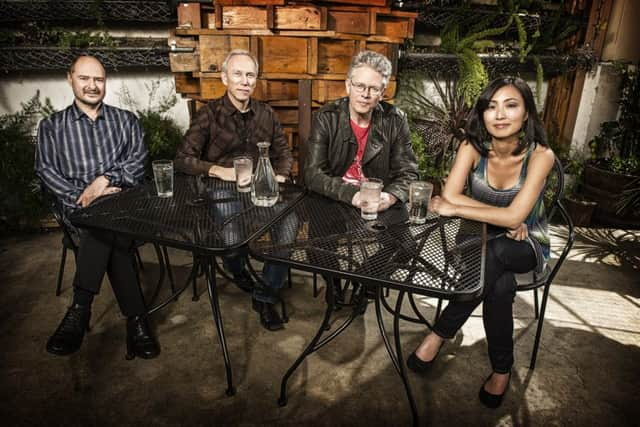Classical review: Kronos Quartet, Edinburgh


Kronos Quartet | Usher Hall, Edinburgh | Rating ****
It’s been the US foursome’s trademark for decades now – taking the classical string quartet far away from its courtly, drawing-room origins and exploding its repertoire with jazz, electronics, rock, theatrics, anything else they can make fit.
And, it almost goes without saying, they’re remarkably good at it – not only astonishingly assured, technically immaculate players, but also attacking all of their styles or musical blends, however bewilderingly contrasting, with confidence and utter conviction.
Advertisement
Hide AdAdvertisement
Hide AdThey were crisp and committed in the gritty modernism of Garth Knox’s astronomically inspired Satellites, and beautifully persuasive in their pensive opener, My Desert, My Rose by Serbian-born Aleksandra Vrebalov. As first violinist David Harrington explained, Kronos had commissioned both of these pieces, together with the cascading harmonies of Guinean Fodé Lassana Diabaté’s evocative Nana Triban that followed, to encourage other quartets to follow in their footsteps, making the scores and parts available for free on their website.
They attacked The Who’s Baba O’Riley with vigour, and Harrington and violist Hank Dutt passed ear-tweaking inflections back and forth in a sumptuous transcription of Indian Raga Bhairavi.
The first half’s highlight, however, was One Earth, One People, One Love by godfather of minimalism Terry Riley, a wide-eyed, throbbing celebration of mankind’s unity written immediately post-9/11 with what felt like a deep sense of shock and melancholy, the Kronos players delivering aching, unpredictable chorales against an endless melody dispatched with understated passion by cellist Sunny Yang.
The evening’s wild card, it turned out, was the brand new Seiche by Lau’s Martin Green, named after a wave form found on standing water, in which the Kronos players tapped stretched-out Slinkies with tuning forks while Green himself toyed with a homespun electronic contraption in the background.
It suddenly erupted into life when violist Hank Dutt emerged with a raw, folksy tune, but otherwise there was little musical substance beyond the piece’s entertaining theatrics.
But to return to the iPod analogy, it wasn’t so much the disconcerting, constantly shifting hotch-potch of styles that concerned, more the lack of context – despite the extensive programme notes supplied by the Usher Hall.
It was as if we were being asked to respond to this eclectic music as stuff that simply sounded nice, without any understanding of the traditions it represented or parallels between the pieces.
Advertisement
Hide AdAdvertisement
Hide AdAll that was swept away, however, by the concert’s far more traditional, thoroughly thought-through second half, with two short numbers by Komitas and Laurie Anderson setting the quiet, thoughtful atmosphere for the far meatier One Hundred Goodbyes by Irish post-minimalist Donnacha Dennehy, which wove a John Adams-ish texture of rippling, constantly evolving harmonies from Kronos around ancient recordings of Irish sean nós folksongs, played with exquisite luminosity. Two light-hearted encores put a smile on the face of what had felt like a rather serious-minded concert, for all Kronos’s stylistic flamboyance.